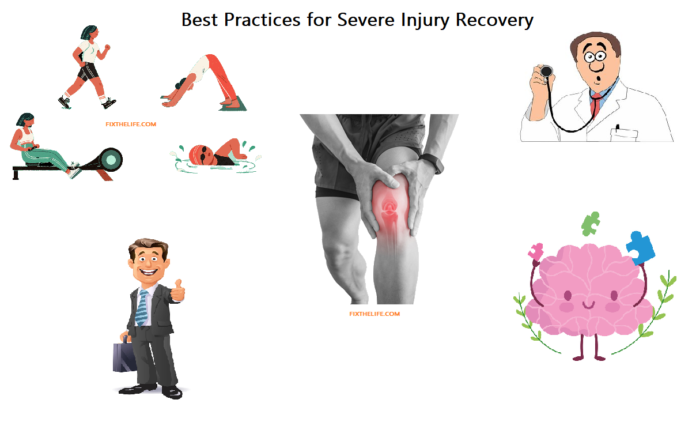Injuries are a part of life. Whether you are an athlete, an office worker, a stay-at-home parent, a student, or a retiree, the human body is a fragile system of many parts that can be damaged by any number of circumstances. You could get hurt while engaging in physical activity, because of a motor vehicle accident, or simply from slipping and falling on ice.
The more severe the injury, the longer your recovery time is likely to be. In the worst cases, your body may be unable to reclaim its former condition. But that doesn’t mean you shouldn’t set yourself up for the best possible recovery after a bad injury.
It is important to prioritize your mental and physical health when you are sidelined for significant damage. If you try to rush back into normalcy too quickly, you could exacerbate the injury. You also need to be concerned about your emotional health if you are dealing with any trauma from the incident. Here are a few best practices for maximizing your injury recovery.
Follow the Doctor’s Orders
First of all, you should see medical personnel after your injury as soon as possible. Even if you don’t think there is significant damage after the accident, you never know what internal issues could be caused by the injury and will manifest later.
Whether it is your personal doctor or another medical professional, make sure that you follow their directions for recovery practices.
They know what they are talking about, and going off-script could result in a re-aggravation of the injury. Even if you feel better, check in with them before taking on tasks that they recommended.
Scale Down Exercises Appropriately
For many injuries, you will have some workout regimen designed to strengthen the areas that have been damaged, especially if muscles or bones were affected.
However, part of recovery is not pushing the damaged parts of your body beyond their limits. While plenty of leg exercises are designed to strengthen, you might have to focus on lowering their intensity or doing fewer reps to foster slow and consistent progress.
Overextending the injured muscles will prolong your recovery period or make the issue even worse. Again, follow the recommendations of medical professionals for what exercises to do and at what level of intensity for effective recovery.
Keeping your legs conditioned has enormous advantages since leg practices work for your biggest muscle bunch. Leg strength further develops equilibrium and coordination, shields your joints from injury.
Strengthening your glutes can greatly increase the stability and overall leg strength. Exercises such as barbell squats, hip thrusts, and walking lunges can help strengthen the legs. Performing yoga have benefits including improving mobility and flexibility.
Consider Financial Implications
One of the side effects of a bad injury could be financial ramifications. If the damage is severe enough, you could miss work or have high medical bills you cannot afford. When this is the case, you should look into ways to cover these payments so that your financial outlook isn’t ruined.
Health insurance may be able to help in some cases. If someone else is responsible for your injury, you could get in touch with a personal injury lawyer and file a claim to win fair compensation that will cover the damages.
Proving that someone else’s negligence caused the injury is a complex process, and an attorney specializing in this field could help you build your case.
Your mental status can hugely affect physical recovery efforts, so secure your finances after the injury to give you peace of mind and a greater focus on the physical side of healing.
Do Not Neglect Emotional Health
A bad injury can be a traumatic experience. Whether you are an athlete whose career has been sidelined or a worker who got into a car accident and is now afraid to drive, your emotional health matters and is a significant part of the recovery period.
Just because your body has healed does not necessarily mean that you are back to normal. If you are struggling with the emotional impact of the injury, it could be worth speaking with a professional. This person could help you talk through your emotions and move past any mental obstacles that have come up as a result of the injury.
Another helpful tip is to work your way back into normal routines slowly. If you got hurt while driving and are worried about being back on the road, try to go out for short drives just around the neighborhood to get back into the swing of things.
Start small and work your way back to emotional health without pushing it to the back of your mind.
In General, Live a Healthy Lifestyle
While there are specific steps to take to recover from an injury, like physical therapy, other general strategies can help you improve your body’s condition. Getting enough sleep each night allows your body’s cells to recover, injecting them with the energy needed to heal the damaged areas. Drinking lots of water is another solution that can help cleanse the body of waste that builds up, especially during the healing process. A healthy diet that supplies your cells with the nutrients needed will allow them to perform their functions.
These general health tips, along with the practices listed previously, can help maximize your injury recovery on a physical, mental, and emotional level.
ALSO CHECK: Smith Machine Squat Death Video Goes Viral: Graphic Content Warning
Adequate Diagnosis: Injuries And Illness Common In Elderly People




